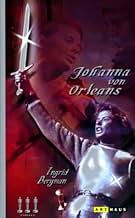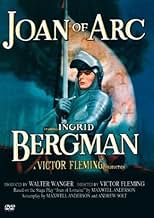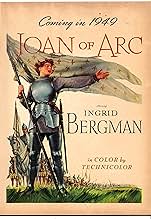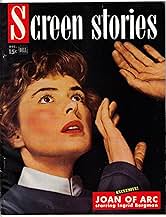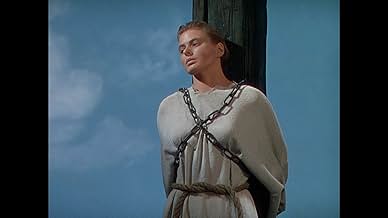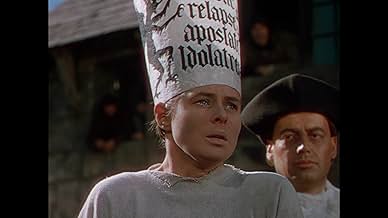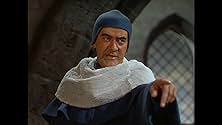IMDb RATING
6.4/10
4.1K
YOUR RATING
The abbreviated life of the 15th-century French heroine.The abbreviated life of the 15th-century French heroine.The abbreviated life of the 15th-century French heroine.
- Won 2 Oscars
- 7 wins & 7 nominations total
Jimmy Lydon
- Pierre d'Arc - Her Younger Brother
- (as James Lydon)
Featured reviews
(NOTE: This review concerns the 100-minute edited cut shown on TCM.)
This 1948 version of Joan of Arc's story is a big disappointment considering the talent involved: director Victor Fleming, who directed both GONE WITH THE WIND and THE WIZARD OF OZ in 1939, and a cast including Ingrid Bergman, José Ferrer, and Ward Bond. JOAN OF ARC (1948) fails to live up to any expectations.
The editing is amateurish. There are abrupt cuts from one shot to the next, often cutting off bits of dialogue on the soundtrack. The voice- over does its job in setting the scenes within a historical narrative, but gives the movie an air of vintage "making of" TV specials. It almost seems as if stand-alone scenes were shot without knowing how to weave them together.
The storytelling is too sincere and sentimental, giving the film an awkward hokey sensibility. Whereas Carl Theodor Dreyer's 1928 masterpiece THE PASSION OF JOAN OF ARC left room for interpretation regarding matters of divine intervention, this version is pretty straightforward about holy miracles, playing like a Sunday school movie. That is to say it's a religious fable about Ste. Joan of Arc, rather than a historical piece about Joan rallying her countrymen against English rule. (Not that there's anything wrong with that.)
Ingrid Bergman was actually nominated for an Academy Award for her portrayal of Joan, a French teenager in the 1400s who believed she was called upon by God to raise an army against the English occupation of her country, later to be convicted of heresy by a council of pro-English clergymen. (It was Bergman's fourth nomination out of a career total of seven, including three wins.) José Ferrer also earned a nomination, playing the French Dauphin whom Joan fought to put on the throne. The top performances were by Bergman as Joan, Francis L. Sullivan as the corrupt judge, and J. Carrol Naish as a slimy one-eyed nobleman. Much of the supporting cast is second-rate.
Maybe JOAN OF ARC is only unimpressive today as viewed by modern cynics. Or perhaps the trouble lies with the existing copies of the film. Whatever the case may be, the movie earned seven Oscar nods (including Best Editing!) and won an honorary award for its moral values.
NOTE: Apparently the original release was a 145-minute cut, which was trimmed down to 100 minutes with added voice-over narration. This chopped-down version is shown on TV and is an embarrassing mess. The 145-minute version won the awards and is supposedly available on DVD.
UPDATE 1/9/12: The full 145-minute version (just shown on TCM) is clearly superior to the edited-down version with the awful narration. It's an ambitious production, although its Sunday School tone is still a bit over-the-top (at least for this reviewer). The film takes itself way too seriously overall, but Jose Ferrer brings personality to the proceedings and Francis L. Sullivan stands out in his villainous role. The second half, with Joan's trial at the hands of the wicked Sullivan, is more effective than the first half and Ingrid Bergman's best moments are in her final scene.
5/10 for the butchered version; 6.5/10 for the full-length epic
This 1948 version of Joan of Arc's story is a big disappointment considering the talent involved: director Victor Fleming, who directed both GONE WITH THE WIND and THE WIZARD OF OZ in 1939, and a cast including Ingrid Bergman, José Ferrer, and Ward Bond. JOAN OF ARC (1948) fails to live up to any expectations.
The editing is amateurish. There are abrupt cuts from one shot to the next, often cutting off bits of dialogue on the soundtrack. The voice- over does its job in setting the scenes within a historical narrative, but gives the movie an air of vintage "making of" TV specials. It almost seems as if stand-alone scenes were shot without knowing how to weave them together.
The storytelling is too sincere and sentimental, giving the film an awkward hokey sensibility. Whereas Carl Theodor Dreyer's 1928 masterpiece THE PASSION OF JOAN OF ARC left room for interpretation regarding matters of divine intervention, this version is pretty straightforward about holy miracles, playing like a Sunday school movie. That is to say it's a religious fable about Ste. Joan of Arc, rather than a historical piece about Joan rallying her countrymen against English rule. (Not that there's anything wrong with that.)
Ingrid Bergman was actually nominated for an Academy Award for her portrayal of Joan, a French teenager in the 1400s who believed she was called upon by God to raise an army against the English occupation of her country, later to be convicted of heresy by a council of pro-English clergymen. (It was Bergman's fourth nomination out of a career total of seven, including three wins.) José Ferrer also earned a nomination, playing the French Dauphin whom Joan fought to put on the throne. The top performances were by Bergman as Joan, Francis L. Sullivan as the corrupt judge, and J. Carrol Naish as a slimy one-eyed nobleman. Much of the supporting cast is second-rate.
Maybe JOAN OF ARC is only unimpressive today as viewed by modern cynics. Or perhaps the trouble lies with the existing copies of the film. Whatever the case may be, the movie earned seven Oscar nods (including Best Editing!) and won an honorary award for its moral values.
NOTE: Apparently the original release was a 145-minute cut, which was trimmed down to 100 minutes with added voice-over narration. This chopped-down version is shown on TV and is an embarrassing mess. The 145-minute version won the awards and is supposedly available on DVD.
UPDATE 1/9/12: The full 145-minute version (just shown on TCM) is clearly superior to the edited-down version with the awful narration. It's an ambitious production, although its Sunday School tone is still a bit over-the-top (at least for this reviewer). The film takes itself way too seriously overall, but Jose Ferrer brings personality to the proceedings and Francis L. Sullivan stands out in his villainous role. The second half, with Joan's trial at the hands of the wicked Sullivan, is more effective than the first half and Ingrid Bergman's best moments are in her final scene.
5/10 for the butchered version; 6.5/10 for the full-length epic
Joan of Arc is perhaps Bergman's finest "high acting" performances. (Her greatest performance is still her "minimalist" performance in "Casablanca"). This is a better than good movie, but not great. With the cast, it should have been GREAT! It is, however, well worth seeing; Bergman is in fine form.
This Ingrid Bergman film was so under-rated. She put her heart and soul into acting the part of her great heroine and then the film was not only slated at the box office but horrendously cut when issued for television and on video. WHY?????? We know it didn't do well at the box office, because of the circumstances of Ingrid's private life in 1949 and 1950 - sadly, Hollywood and the whole world judged this lovely lady and they shouldn't judge anyone, ever!!! Miss Bergman was a lady and a great actress. But why was the film cut for video? The cut version, with silly voice overs and maps, is not one iota as good as the full version, where we see the young Joan and her experiences of her voices and also have a fuller version of the trial - where her acting is nothing short of brilliant. I hope someone who is able to influence the issuing of the entire film on DVD reads this comment! Mary
"Joan of Arc" is a film with a much larger budget and more prestigious cast than you'd expect from a movie released by RKO. After all, RKO was clearly a second-tier studio whose output was far lower budgeted than most films from MGM, Twentieth Centure-Fox and Warner Brothers. But here, the studio released a prestige film...with vivid color, a LOT of familiar actors and a plot involving one of the great women of the late Middle Ages. Unfortunately, the public did NOT respond well to this and the film actually lost money. How?
Ingrid Bergman plays the title character and the story consists of her life from her middle teens to her execution at age 19. This is a SERIOUS problem, as when the film began she was about 15-16...and looked like the 33 years she actually was.
The other main problem with the film is that the filmmakers were too reverential towards the character...with dirge-like music and a pace slower than a snail! Telling it faster and with perhaps more behind the scenes intrigues would have helped. Regardless, I just kept wanting the film to speed up...particularly at the end when you KNOW what's going to happen and it takes too long to get there. Well made and nice looking...but also a film that might bore you as well.
By the way, although it didn't impact my viewing, the film was a pet project of Ingrid Bergman but she also was responsible for helping to tank the film. Negative publicity about her affair with a married man became public at about the time the film was released. This very unsaint-like behavior surely must have negatively impacted the box office numbers.
Ingrid Bergman plays the title character and the story consists of her life from her middle teens to her execution at age 19. This is a SERIOUS problem, as when the film began she was about 15-16...and looked like the 33 years she actually was.
The other main problem with the film is that the filmmakers were too reverential towards the character...with dirge-like music and a pace slower than a snail! Telling it faster and with perhaps more behind the scenes intrigues would have helped. Regardless, I just kept wanting the film to speed up...particularly at the end when you KNOW what's going to happen and it takes too long to get there. Well made and nice looking...but also a film that might bore you as well.
By the way, although it didn't impact my viewing, the film was a pet project of Ingrid Bergman but she also was responsible for helping to tank the film. Negative publicity about her affair with a married man became public at about the time the film was released. This very unsaint-like behavior surely must have negatively impacted the box office numbers.
A very poor film translation of a stage play--rather than being tailored to the movie medium, this is very stagy, overly talky. The dialogue is arty and artificial. Everyone is obviously acting, giving a performance, though Bergman is radiant and her performance is passionate and sincere.
All of the exteriors (outdoor shots) which feature close ups of the lead actors are obviously shot on a sound stage. Some beautiful outdoor footage is used occasionally for establishing shots or transitions between scenes, but Bergman never leaves the soundstage.
On the positive side, the film is beautifully photographed, many individual shots are works of art, masterfully lit and composed. However, the camera moves only when necessary to follow the actors, the shots are static, adding to the staginess of the production. Which reminds me of CB DeMille; you could get a good idea of this film by saying it's like a DeMille film, only with more high art pretensions and less spectacle (no cast of thousands here).
The most outstanding aspect of 'Joan of Arc' is the music, it's prominently featured, good and loud, and it deserves to be--it's gorgeous.
The DVD has no extras at all, though the image and sound are excellent--a very good restoration job. A commentary track would have been very welcome; my guess is this was a challenging production, possibly with a long production period (three cinematographers are listed). It was a commercial failure, at least in part because of public condemnation of Bergman's personal life. I believe director Victor Flemming died soon after production. Lots of meat here for an interesting commentary or two.
All of the exteriors (outdoor shots) which feature close ups of the lead actors are obviously shot on a sound stage. Some beautiful outdoor footage is used occasionally for establishing shots or transitions between scenes, but Bergman never leaves the soundstage.
On the positive side, the film is beautifully photographed, many individual shots are works of art, masterfully lit and composed. However, the camera moves only when necessary to follow the actors, the shots are static, adding to the staginess of the production. Which reminds me of CB DeMille; you could get a good idea of this film by saying it's like a DeMille film, only with more high art pretensions and less spectacle (no cast of thousands here).
The most outstanding aspect of 'Joan of Arc' is the music, it's prominently featured, good and loud, and it deserves to be--it's gorgeous.
The DVD has no extras at all, though the image and sound are excellent--a very good restoration job. A commentary track would have been very welcome; my guess is this was a challenging production, possibly with a long production period (three cinematographers are listed). It was a commercial failure, at least in part because of public condemnation of Bergman's personal life. I believe director Victor Flemming died soon after production. Lots of meat here for an interesting commentary or two.
Did you know
- TriviaThe first film to receive 7 Academy Award nominations without receiving a Best Picture nomination.
- GoofsLength of Joan's chain mail is different from 43:38 to 44:29.
- Quotes
La Hire: Why are you crying?
Joan of Arc: Because they're dead. Horribly dead. And it was I who killed them.
La Hire: Killed who?
Joan of Arc: All these men. Ours, and the enemy's.
La Hire: Huh! Are you crying about the English?
Joan of Arc: I have no hatred for the English. I spoke bold and loud so that you would follow me. I thought victory would be beautiful, but it is an ugly, bloody thing.
La Hire: Why, there never was a more beautiful victory than this!
- Crazy creditsIn the 145-minute version of the film, the cast list, naming not only the actors but who they played, was deliberately presented in the style of the cast list of "Gone With the Wind", in order to evoke the feeling of an epic about to be presented. Victor Fleming, who directed "Joan of Arc", had also directed "Gone With the Wind" (after replacing George Cukor, "GWTW"'s original, uncredited director).
- Alternate versionsIn 1998, UCLA restored "Joan of Arc" to its original length of 145 minutes, and the complete version was finally given its first public screening in nearly fifty years on December 3, 1998.
- ConnectionsFeatured in Prince of Pirates (1953)
- How long is Joan of Arc?Powered by Alexa
Details
- Release date
- Country of origin
- Languages
- Also known as
- Juana de Arco
- Filming locations
- Balboa, Newport Beach, California, USA(Assault on the Tourelles)
- Production companies
- See more company credits at IMDbPro
Box office
- Budget
- $4,600,000 (estimated)
- Runtime2 hours 25 minutes
- Color
- Aspect ratio
- 1.37 : 1(original release)
Contribute to this page
Suggest an edit or add missing content


